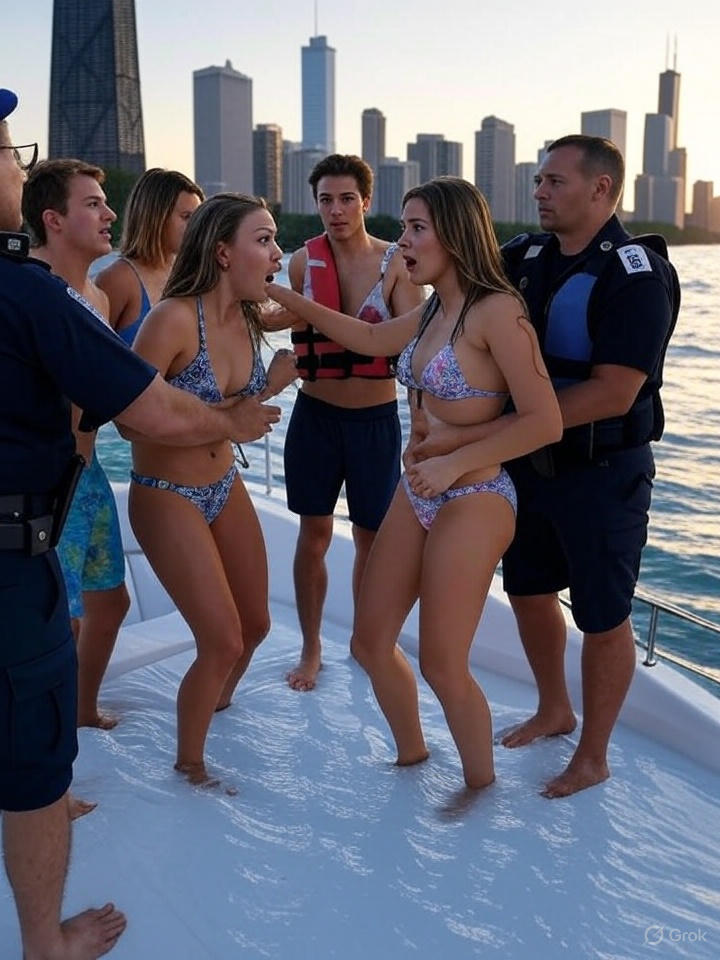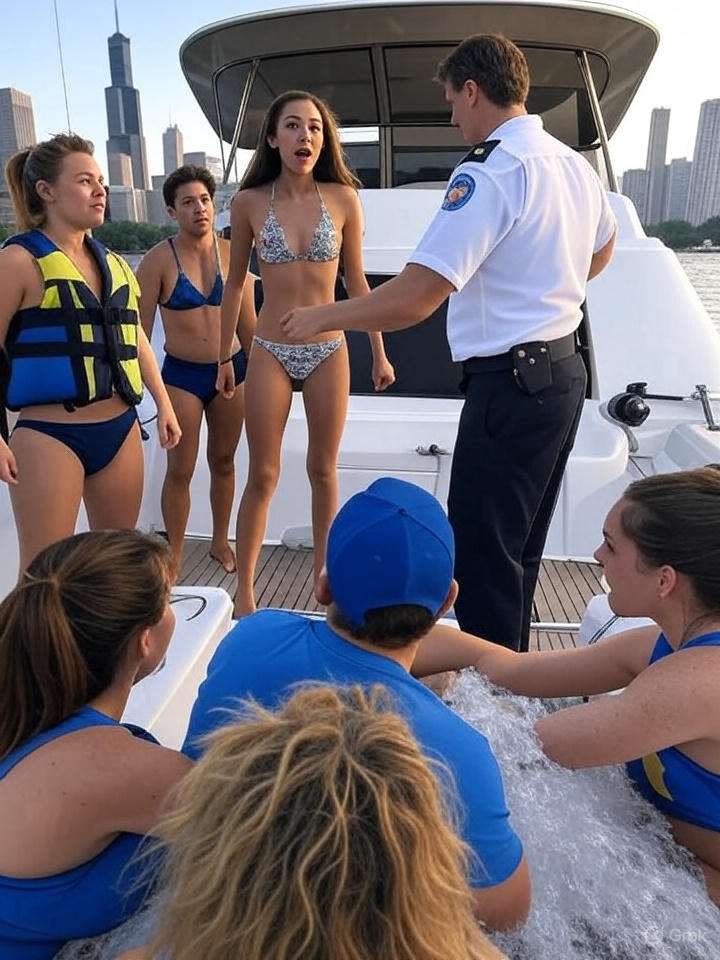
July 18, 2025
Boating
Chicago Alderman Stephanie Coleman has introduced a groundbreaking ordinance that mandates all boaters wear life vests while on the water, following a tragic drowning incident during Black Yacht Weekend. This proposed law aims to enhance safety in the bustling Playpen area of Lake Michigan, where overcrowding and alcohol-fueled antics have led to multiple fatalities. But is this law a necessary lifesaver or an overreach? Dive into the details as we explore the pros and cons of this contentious issue, and consider the broader implications for boating culture in the Windy City. Safety should never be optional—what do you think?
” Imposing fines up to $500 could alienate boaters, leading to backlash or ignored rules, as seen in some European contexts.”
Yesterday, on July 17, 2025, Chicago Alderman Stephanie Coleman (16th Ward) introduced a groundbreaking ordinance that could reshape boating culture in the Windy City. The proposal mandates that all boaters, regardless of age or vessel type, must wear life vests at all times while on the water—including in the infamous Playpen area on Lake Michigan. This comes in the wake of a tragic drowning during Black Yacht Weekend in late June, where 27-year-old Zahrie Walls lost her life after falling overboard. While two others were saved thanks to their life vests, Walls’ death highlighted a glaring safety gap. But is this law a lifesaver or an overreach? In this article, we’ll dive deep into the details, explore the pros and cons, and consider its broader implications. Buckle up—or should I say, vest up—as we navigate this contentious issue.

Chicagoans, voice your thoughts in the comments: Vest up or fight back? Whatever the outcome, one thing's clear: on the water, safety should never be optional.
First, let’s set the scene. Chicago’s Playpen is not your average playground—it’s a bustling, no-wake boating hotspot on Lake Michigan, located just south of Oak Street Beach and north of Navy Pier. Often described as a “boater’s paradise,” it’s where powerboats raft together for sun-soaked parties, swimming, and socializing. According to local sources like the Chicago Tribune, it’s a see-and-be-seen spot that attracts thousands during peak summer weekends. However, its popularity comes with peril: rough waters, overcrowding, and alcohol-fueled antics have led to multiple fatalities. In 2022 alone, several deaths occurred there, including a boat capsizing incident. In 2023, a woman died after her vessel flipped, and in 2024, a man went missing after falling overboard. The U.S. Coast Guard reported assisting 107 people and conducting 46 search-and-rescue operations during this year’s Black Yacht Weekend, saving 16 lives amid choppy conditions and extreme heat.


First, let’s set the scene. Chicago’s Playpen is not your average playground—it’s a bustling, no-wake boating hotspot on Lake Michigan, located just south of Oak Street Beach and north of Navy Pier. Often described as a “boater’s paradise,” it’s where powerboats raft together for sun-soaked parties, swimming, and socializing. According to local sources like the Chicago Tribune, it’s a see-and-be-seen spot that attracts thousands during peak summer weekends. However, its popularity comes with peril: rough waters, overcrowding, and alcohol-fueled antics have led to multiple fatalities. In 2022 alone, several deaths occurred there, including a boat capsizing incident. In 2023, a woman died after her vessel flipped, and in 2024, a man went missing after falling overboard. The U.S. Coast Guard reported assisting 107 people and conducting 46 search-and-rescue operations during this year’s Black Yacht Weekend, saving 16 lives amid choppy conditions and extreme heat.
Ald. Coleman’s ordinance, proposed during a City Council meeting, aims to address these risks head-on. It requires life vests (also known as personal flotation devices or PFDs) for everyone on any vessel, from sailboats to personal watercraft. Violators could face fines up to $500. Coleman emphasized prevention over reaction, stating the goal is to spare families the grief of preventable losses. She also noted potential protections for captains and charter owners from liability. While the proposal praises event organizers for their safety efforts, it doesn’t detail enforcement mechanics—likely falling to the Chicago Police Department—or specify vest types, which range from basic foam models to inflatable ones.
This isn’t happening in a vacuum. Boating accidents on Lake Michigan are alarmingly common. According to the Great Lakes Surf Rescue Project, there were 77 drownings across the Great Lakes in 2024, with 44 in Lake Michigan alone. As of mid-2025, 38 drownings have occurred region-wide, 19 in Lake Michigan—including three in Michigan waters. Nationally, the U.S. Coast Guard’s 2024 Recreational Boating Statistics report 3,887 accidents, 556 deaths, and over $88 million in property damage. In Chicago’s waters, factors like sudden weather changes, heavy traffic, and operator inexperience exacerbate risks. Coleman’s law seeks to mirror stricter regulations elsewhere, but it’s bolder than most.
The strongest argument in favor of mandatory life vests is simple: they save lives. Studies show that wearing a PFD reduces drowning risk by up to 50%, per research from the National Institutes of Health. In cold water like Lake Michigan’s (often below 70°F even in summer), hypothermia sets in quickly, making swimming impossible without aid. During the Black Yacht Weekend incident, life vests were the difference between survival and tragedy for those who fell in.
Proponents, including Mike McElroy, president of the Chicago Harbor Safety Committee, view this as a “good first step.” McElroy points to the 7,000 recreational boaters in Chicago harbors, many lacking formal education—especially those born before 1998, exempt from current requirements. The law could complement ongoing pushes for mandatory boater education and event permitting, ensuring safety plans for large gatherings. Imagine a scenario where a sudden wave hits a rafted group in the Playpen; vests could prevent panic-induced drownings.
From a broader perspective, similar laws in other states have proven effective. For instance, Alabama requires all individuals on vessels to wear USCG-approved Type I, II, or III vests. California mandates them for children under 13 on moving vessels, and several states like Washington and Oregon require them on personal watercraft or during towing activities. Norway, with a similar law for boats under 26 feet since 2015, has seen reduced fatalities and fines for non-compliance. In the U.S., federal law already requires vests for kids under 13 on moving boats, and extending this to adults could standardize safety. Advocates argue it’s no different from seatbelt laws, which faced initial resistance but now save thousands annually.
Environmentally and economically, the pros extend further. Fewer accidents mean less strain on rescue resources—the Coast Guard’s 2024 efforts cost millions. For families, it’s priceless: preventing one death like Walls’ avoids immeasurable heartbreak. Events like Black Yacht Weekend could even benefit, as organizers could promote “vest-friendly” vibes, turning safety into a community norm. Inflatable vests, which are comfortable and auto-inflate on water contact, address discomfort concerns, making compliance feasible without sacrificing fun.
On the flip side, critics argue this law infringes on personal freedoms and could dampen Chicago’s vibrant boating scene. Boating is about relaxation and adventure—mandating vests might feel like government overreach, especially for experienced adults. As one Reddit user quipped about similar laws, “It’s like requiring helmets for walking—sure, safer, but unnecessary for most.” In hot Chicago summers, bulky vests could cause discomfort, overheating, or restricted movement, potentially leading to non-compliance or accidents from fumbling gear.
Enforcement poses significant challenges. McElroy himself raised concerns: Who defines an acceptable vest? There are five types, from inherently buoyant (pros: reliable, cons: bulky) to inflatables (pros: comfortable, cons: need maintenance). Below-deck exemptions make sense to avoid entrapment in capsizes, but policing this on crowded waters would burden the already stretched Chicago Police. With 7,000 boaters, spot-checks could lead to selective enforcement, disproportionately affecting minority communities or events like Black Yacht Weekend.
Economically, there’s worry about tourism. The Playpen draws visitors for its party atmosphere; strict rules might drive them to less regulated spots, hurting charter businesses and local economies. National data shows boating contributes billions annually—overregulation could stifle that. Critics point out that vests don’t address root causes like alcohol impairment (a factor in 50% of boating deaths per Coast Guard stats) or inexperience. Why not focus on education, like mandatory courses for all, or better weather alerts?
Comparisons to other states highlight the rarity of universal adult mandates. Most, like Florida or Texas, require vests on board but not worn unless for kids or high-risk activities. A 2014 study on barriers to life jacket use found adults resist due to perceived low risk, discomfort, and the “it won’t happen to me” mentality. Imposing fines up to $500 could alienate boaters, leading to backlash or ignored rules, as seen in some European contexts.
Public reactions are mixed. While safety advocates applaud, boaters on forums express frustration: “This kills the fun of the Playpen.” Coleman hasn’t detailed implementation, leaving room for amendments, but initial pushback suggests a heated debate ahead.
Chicago’s proposed life vest law is a bold response to a deadly problem, born from tragedy and aimed at prevention. The pros—enhanced safety, life-saving potential, and alignment with broader education efforts—outweigh the cons for many, especially given Lake Michigan’s grim statistics: over 40 deaths in 2024 alone. Yet, the cons are valid: freedom, enforcement woes, and economic impacts can’t be ignored. Perhaps a compromise could bridge the gap.
Let’s ensure the law is practical, equitable, and informed by data. Chicagoans, voice your thoughts in the comments: Vest up or fight back? Whatever the outcome, one thing’s clear: on the water, safety should never be optional.
Post Tags :
What summertime Chi looks like after you find your friends with boats ✨
Drone footage by @lensoflyons
#chicago #playpen #playpenchicago #lakemichigan #summer2025 #chicagonightlife #theplaypenchicago

What summertime Chi looks like after you find your friends with boats ✨
Drone footage by @lensoflyons
#chicago #playpen #playpenchicago #lakemichigan #summer2025 #chicagonightlife #theplaypenchicago
...
What an unforgettable blast at the Chicago Scene Boat Party 2025 at The Playpen! 🎉🛥️ Thousands of partygoers, hundreds of boats tied up, non-stop beats, and vibes that lit up Lake Michigan. Total success – already counting down to next year! Who’s in? #ChicagoSceneBoatParty #PlaypenChicago #BoatParty2025 #SummerVibes

What an unforgettable blast at the Chicago Scene Boat Party 2025 at The Playpen! 🎉🛥️ Thousands of partygoers, hundreds of boats tied up, non-stop beats, and vibes that lit up Lake Michigan. Total success – already counting down to next year! Who’s in? #ChicagoSceneBoatParty #PlaypenChicago #BoatParty2025 #SummerVibes ...
🥂 to more summer nights ...
The Playpen’s where you’ll find us 🙌
#chicago #playpen #playpenchicago #lakemichigan #summer2025 #chicagonightlife

The Playpen’s where you’ll find us 🙌
#chicago #playpen #playpenchicago #lakemichigan #summer2025 #chicagonightlife
...
We only have so much summer in Chicago, can you blame us… 😅
#chicago #playpen #playpenchicago #lakemichigan #summer2025 #chicagonightlife

We only have so much summer in Chicago, can you blame us… 😅
#chicago #playpen #playpenchicago #lakemichigan #summer2025 #chicagonightlife
...
We’re feeling like ✨ find your friends with boats and join us on the lake at playpenchicago.com!
#chicago #playpen #playpenchicago #lakemichigan #summer2025 #chicagonightlife

We’re feeling like ✨ find your friends with boats and join us on the lake at playpenchicago.com!
#chicago #playpen #playpenchicago #lakemichigan #summer2025 #chicagonightlife
...
🚤⚠️ Breaking: Chicago’s proposed life vest law just dropped – mandatory flotation fashion for ALL boaters, even in the Playpen! After a tragic drowning at Black Yacht Weekend, Ald. Coleman says it’s time to “vest up or pay up” (fines up to $500!).
Pros: Could save lives on choppy Lake Michigan waves.
Cons: Goodbye, flawless bikini tan lines – hello, awkward vest vibes! 😅
Safety’s no joke, but is this overkill or overdue? Spill your thoughts in the comments: Hero move or party pooper? Tag your boating squad and share if you’ve got a lake story!
#ChicagoLifeVestLaw #PlaypenDrama #BoatSafety #VestOrArrest
Is this proposed law overkill?

🚤⚠️ Breaking: Chicago’s proposed life vest law just dropped – mandatory flotation fashion for ALL boaters, even in the Playpen! After a tragic drowning at Black Yacht Weekend, Ald. Coleman says it’s time to “vest up or pay up” (fines up to $500!).
Pros: Could save lives on choppy Lake Michigan waves.
Cons: Goodbye, flawless bikini tan lines – hello, awkward vest vibes! 😅
Safety’s no joke, but is this overkill or overdue? Spill your thoughts in the comments: Hero move or party pooper? Tag your boating squad and share if you’ve got a lake story!
#ChicagoLifeVestLaw #PlaypenDrama #BoatSafety #VestOrArrest
Is this proposed law overkill?
...
Where have you been all summer? ...
Copyright © 2022-2025 The Playpen Enterprises LLC – All Rights Reserved